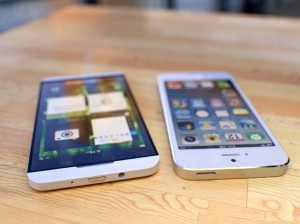 Blackberry era acum cativa ani de zile unul dintre cei mai mari producatori de smartphone-uri de pe glob, terminalele sale fiind utilizate de catre guverne si oameni de afaceri de pe intreaga planeta. Lansarea iPhone a lasat Blackberry in deriva, compania canadiana pierzand in cativa ani aproape tot ceea ce a castigat de-a lungul timpului, ajungand acum sa se lupte pentru supravietuire in timp ce continua sa piarda bani si clienti in fiecare trimestru fiscal.
Blackberry era acum cativa ani de zile unul dintre cei mai mari producatori de smartphone-uri de pe glob, terminalele sale fiind utilizate de catre guverne si oameni de afaceri de pe intreaga planeta. Lansarea iPhone a lasat Blackberry in deriva, compania canadiana pierzand in cativa ani aproape tot ceea ce a castigat de-a lungul timpului, ajungand acum sa se lupte pentru supravietuire in timp ce continua sa piarda bani si clienti in fiecare trimestru fiscal.
De ce a ajuns Blackberry in aceasta situatie? O carte numita Losing the Signal incearca sa ne explice greselile pe care cei de la Blackbery le-au facut dupa lansarea iPhone si care au adus compania in postura de a lupta pentru a evita intrarea in faliment. Totul a inceput cu lansarea iPhone, care a luat prin surprindere majoritatea producatorilor de smartphone-uri, unul dintre principalele avantaje ale terminalului fiind oferirea unor functii pe care operatorii le-au interzis in trecut producatorilor de smartphone-uri, adica un browser web si un magazin de aplicatii.
Totusi, principala problema a managerilor Blackberry, RIM la acea vreme, a fost ca nu au privit iPhone-ul drept un competitor direct, considerand ca lipsa securizarii sistemului de operare si a tastaturii fizice nu prezinta o amenintare pentru propriile produse. Realitatea le-a demonstrat ca baza lor de clienti cauta de fapt asemenea functii, majoritatea lasand in urma smartphone-urile Blackberry pentru cele ale iPhone.
If the iPhone gained traction, RIM’s senior executives believed, it would be with consumers who cared more about YouTube and other Internet escapes than efficiency and security. RIM’s core business customers valued BlackBerry’s secure and efficient communication systems. Offering mobile access to broader Internet content, says Mr. Conlee, “was not a space where we parked our business.”
Cei de la Blackberry credeau ca iPhone-urile vor fi “iubite” in principal de persoanele carora le place sa urmareasca filme pe YouTube si nu le pasa de securitate, baza de clienti a companiei punand accent pe securitate si sistemele de comunicatii criptate. Din nou, cei de la RIm nu au inteles exact ce vor clientii lor, realizand prea tarziu ca oamenii nu mai vor telefoane cu taste, insa eforrturile lor de a combate terminalul Apple s-au dovedit a fi sortite esecului.
Practic cei de la RIM s-au bazat pe faptul ca oamenii nu vor tehnologii noi care le ofera acces mai larg la internet si prefera sa foloseasca telefoane vechi cu ecrane mici si taste fizice, iar acest lucru le-a adus sfarsitul. Mai multe detalii puteti citi aici.





















